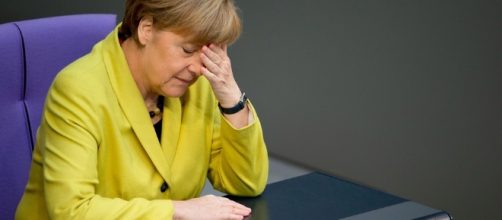The distance increases from what seems to be another certain victory for Chancellor Angela Merkel, on Germany's next Sunday's elections, tension gathers as witnessed during the conservative alliance's campaign rallies.
All over Germany protesters associated with far-right AfD, (Alternative for Germany), have been taunting the Chancellor's campaign, aiming at Merkel's powerlessness to confront the arrival of more than a million refugees to Germany, since 2015.
Carrying banners with a clear 'Get lost' message and 'Merkel must go', even tomatoes flew towards the incumbent, and yet to become new Chancellor of a coalition that sparks doubt and uncertainty.
Jaded euro zone rescuers rising up the anti-establishment
Days after the European commission's state of the union address, where its president, Jean-Claude Juncker, spoke with high hopes for expansion in the EU block, the angry voters took the opportunity to oppose these same hopes, with growing skepticism towards an indebted euro zone.
To no surprise, the debt crisis that followed since 2008 still hovers around where it hurts more: inside the people's pockets. With Germany being no different, Angela Merkel's image of a once bold leader is now showing clear signs of losing some clout.
Uncertain and unforgiving about the Chancellor's non-response to Germany's own economic and internal affairs, these protests are aimed at another particular point.
Complex voting system
With the Free Democratic Party rejecting European expansion, the potential partner in Merkel's coalition will surely lead to sour backroom negotiations, once a government is established in the Bundestag.
Signalling to challenge European Central Bank policies and other euro-area countries, FDP's leader Christian Lindner is set to shake-up next Sunday's elections, as he proposes bringing back Russia aboard the G-7.
Add to this its quite complex voting system - the German voter simultaneously picks, not only a candidate for their district representative, but has the right for a second vote, in which a political Party is chosen.
By splitting their vote, the end result is the odds of having a far-right Party winning seats in the Bundestag now becomes a reality for the first time since WWII.
It appears that ultimately, the run for third place will weigh in drastically. Never having won 51% of popular vote, (in the past 3 terms), Angela Merkel faces a wave of populism that will demand more than just skillful steering, in order to maintain a grand coalition.


